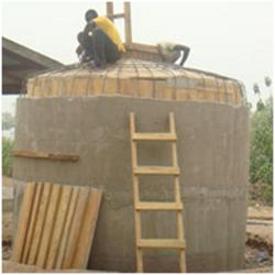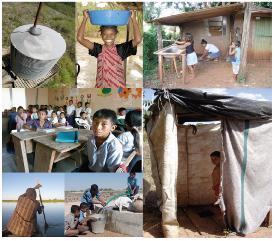

Environmental education
Ghana: Smart Water for Green Schools


This project was developed by Green Cross International to support Green Cross Ghana's clean water, green schools initiative. Green Cross is raising funds in Australia to support this work. We especially encourage the more than 10,000 Aussie students involved in our Green Lane Diary program to fundraise at their local schools to make Ghana schools more healthy and green.
Over 1.1 billion people do not have access to drinkable water, leaving roughly one sixth of the world's population at risk of contracting fatal diseases and illnesses. Green Cross International's Smart Water for Green Schools initiative is a local and concrete approach to reverse the present trends of water-related illness and death. Through the construction and implementation of rainwater harvesting systems and ecological latrines, the project will provide a reliable supply of water, hygiene and sanitation facilities, as well as environmental education to school children, teachers, and parents living in transboundary river basins around the globe.
Green Cross has worked on water access in Africa since 1994 and today has national offices in Burkina Faso, Ghana, Ivory Coast and Swaziland. The Smart Water for Green Schools project builds on our goals of supporting sustainable and peaceful development. The initial focus in Africa will expand to other parts of the world over time.
Ghana pilot expands to new schools
On Africa Day 2010 Green Cross International announced the extension of the Smart Water for Green Schools project to four more schools in Ghana. This follows a successful pilot phase at the Al-Iman Primary School in the Bong Ahafo Region. The project extension to the additional schools will provide 2,000 school children and some 70 teachers in the five communities with access to water and better sanitation, benefiting a local population of 10,500.
"It is the overwhelmingly positive feedback from the pilot communities that has ensured that the project is extended. The Smart Water for Green Schools project is vital to the health and livelihood of communities in Ghana because of our diminishing water tables and polluted water sources," said Mubarick Masawudu, President and CEO of Green Cross Ghana. "The water collected in the harvesting systems is often the only source of clean water in the community," he said.
The project builds reliable and long-lasting rainwater harvesting systems and ecological latrines in schools. It is a cost effective and efficient means to secure water supplies and improve water sanitation for entire school communities. The project also ensures hygiene and sanitation education. By encouraging exchanges between schools in the same river basins, the partnership aims to promote smart water systems and water conservation at local, national and international levels. Providing water and sanitation services to schools is an important step to engage children and communities in improving their water security and maintaining their roles as guardians of healthy and vital river ecosystems.
Smart Water for Green Schools is being supported by Green Cross International partner Pureology Serious Colour Care® . In Australia Pureology is fundraising through their salons to support the work.
Healthy rivers are vital for sustainable and peaceful development
"No access to water can be sustainable without peace and joint management of resources," says Pierre Muller, Green Cross International Vice-President and former mayor of Geneva, Switzerland. According to the World Bank, only 58% of the population of Sub-Saharan Africa has access to a piped water supply and only 37% has access to improved sanitation.
Green Cross International is actively promoting the ratification and ultimate entry into force of the 1997 UN Watercourses Convention to establish basic standards and rules for cooperation on the use, management and protection of the world's 263 international watercourses. Currently, the Convention has 18 contracting states - 17 short of the number required for implementation.
"West African States have engaged in ambitious trans-boundary basin organisations such as the Volta Basin Organization or the Organization for the Management of the Senegal River (OMVS) and this ought to be applauded. The ratification of the Convention in West Africa is of particular importance as it would harmonize regional efforts, fill in gaps of governance and provide coverage for the 20 smaller West African trans-boundary watercourses not governed by any international governance mechanisms," said Green Cross International Water Programme Leader Marie-Laure Vercambre.
"Therefore GCI and Green Cross's West African national organizations, together with partners, are supporting national consultations to discuss the relevance of the UN Watercourses Convention in Ghana and Burkina Faso, both riparian States of the Volta basin."
Error parsing XSLT file: \xslt\MoreInformation-Content.xsltCopyright © Green Cross Australia | Terms & Conditions | Privacy Policy
web design brisbane :: (zero)seven
